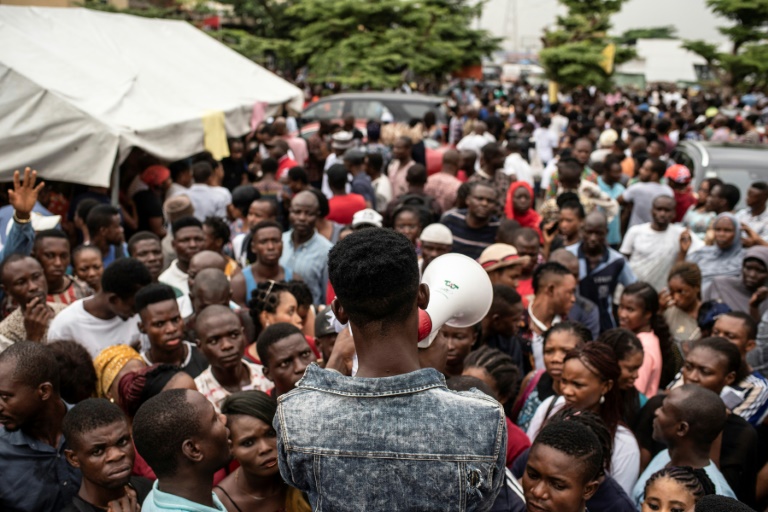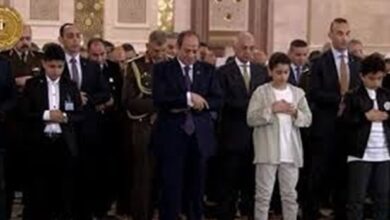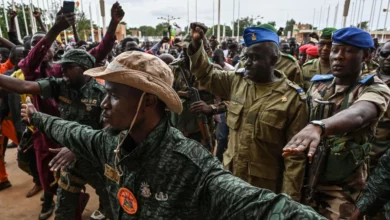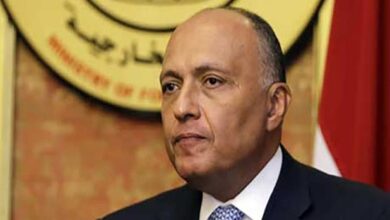
Nigerians vote for a new president on Saturday after a week-long delay that has raised political tempers, sparked conspiracy claims and stoked fears of violence.
Some 120,000 polling stations were due to open at 0700 GMT, from megacity Lagos and the oil hub Port Harcourt in the south, to ancient Kano in the north and the country’s rural heartlands.
Results are expected from early next week, with the winner gaining control of Africa’s most populous nation and leading oil producer for four years.
In a crowded field of 73 presidential hopefuls, the two frontrunners — incumbent Muhammadu Buhari, 76, and former vice president Atiku Abubakar, 72 — are expected to vote in their home towns.
Electors are also choosing 360 members of the House of Representatives and 109 senators from a choice of 6,500 candidates.
The Independent National Electoral Commission (INEC) last Saturday announced a one-week delay to the election, just hours before it was due to get under way.
That angered voters who had already travelled to their home towns and villages to participate, and saw the main parties accuse the other of conspiring with INEC to rig the result.
Neither has produced evidence and the elections watchdog has worked round the clock to overcome difficulties in delivering materials, which it had blamed for the postponement.
INEC chairman Mahmood Yakubu has given an indication of the scale of the task, announcing that more than 825,000 temporary staff had been drafted in to help conduct the vote.
More than 80,000 vehicles and nearly 1,000 boats have been hired to transport ballot papers, results and other materials to and from polling units.
“I want to reassure you that elections will be held on Saturday,” he said on Thursday. “There won’t be another postponement.”
Security fears
The logistical fine-tuning, however, has been overshadowed by comments from Buhari that he had ordered security forces to be “ruthless” with vote-riggers and ballot-box snatchers.
Critics said his warning was a “license to kill” to the police and the military, while Abubakar said his comments were not fitting for an elected head of state.
Buhari has since sought to reassure voters not to be afraid, promising an “atmosphere of openness and peace, devoid of fear from threat or intimidation”.
Analysts SBM Intelligence say 233 people were killed in 67 incidents of election-related violence from last October to Friday — an average of two people per day.
The election campaign has come against a backdrop of wider violence from Boko Haram Islamists and criminal gangs in the north that have killed more than 200 people this month alone.
That could affect participation in some affected areas and combine with voter apathy from last weekend’s postponement to affect turnout, according to analysts.
Just over 84 million people were registered to vote but only 72.7 million (86 percent) of those will be allowed to vote, as they have picked up their voter identity cards.
Task ahead
In 2015, former military ruler Buhari became the first opposition candidate in Nigerian history to defeat a sitting president, beating Goodluck Jonathan by 2.5 million votes.
Buhari has again vowed to be tough on insecurity and corruption, and wants to complete much-needed road and rail infrastructure projects, as well as social mobility schemes.
Abubakar is a pro-business free marketeer whose main pledges have been to privatize giant state-run companies and float the embattled naira currency.
Nigerian elections have previously been characterized by voting along ethnic and religious lines.
But with Buhari and Abubakar both northern Muslims, that could split the northern vote, making southern states a key battleground.
Opponents have accused Buhari of trying to manipulate the judiciary that would rule on any dispute about the results, after he suspended the country’s chief justice this month.
Nigeria’s Business Day newspaper on Friday said whoever wins has to repair a “broken economy” limping back from recession, and hit by high unemployment, inflation and weak growth.
Some 87 million Nigerians live in extreme poverty, with the gulf between haves and have-nots widening.




